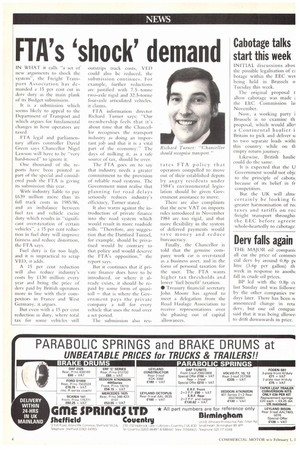FTA's 'shock' demand
Page 4

If you've noticed an error in this article please click here to report it so we can fix it.
IN WI IAT it calls "a set of new arguments to shock the system", the Freight Transport Association has demanded a 15 per cent cut in dery duty as the main plank of its Budget submission.
It is a submission which seems likely to appeal to the Department of Transport and which argues for fundamental changes in how operators are taxed.
FTA legal and parliamentary affairs controller David Green says Chancellor Nigel Lawson will have to be "very hard-nosed" to ignore it.
One thousand of the reports have been printed as part of the special and considered push the FTA is giving its submission this year.
With industry liable to pay £639 million more than its full track costs in 1985/86, and an imbalance between fuel tax and vehicle excise duty which results in "significant over-taxation of certain vehicles", a 15 per cent reduction in fuel duty will improve fairness and reduce distortion, the FTA says.
Fuel duty is far too high, and it is impractical to scrap V ED, it adds.
A 15 per cent reduction will also reduce industry's costs by 1:130 million every year and bring the price of dery paid by British operators more in line with their Competitors in France and West Germany, it argues.
But even with a 15 per cent reduction in duty, where total tax for some vehicles still outstrips track costs, V El) could also be reduced, the submission continues. For example, further reductions are justified with 7.5tonne two-axle rigid and 32.5-tonne four-axle articulated vehicles, it claims.
FTA information director Richard Turner says: "Our membership feels that it's about time that the Chancellor recognises the transport industry as doing an important job and that it is a vital part of the economy." The days of milking it, as a safe source of tax, should be over.
The FTA goes on to say that industry needs a greater commitment to the provision of reliable road systems. The Government must realise that planning for road delays seriously reduces industry's efficiency, Turner stated.
It also warns against the introduction of private finance into the road system which would result in more roadside tolls. "Therefore, any sugges tion that the Dartford Tunnel, for example, should be privatised would be contrary to that policy and would deserve the PTA's opposition," the report says.
But it continues that if private finance does have to be introduced, or where it al ready exists, it should be repaid by some form of quasi toll — that is where the Government pays the private company a toll for every vehicle that uses the road over a set period.
The submission also res tates FTA policy that operators compelled to move out of their established depots by angry residents under 1984's environmental legislation should be given Government assistance to move, There are also complaints that the new VAT on imports rules introduced in November 1984 arc too rigid, and that more flexibility in the system of deferred payments would save money and reduce bureaucracy.
Finally, the Chancellor is told that the genuine company work car is over-taxed as a business asset, and in the form of personal taxation for the user. The FTA wants higher tax thresholds and lower 'fuel benefit' taxation.
• Treasury financial secretary John Moore has agreed to meet a delegation from the Road Haulage Association to receive representations over the phasing out of capital allowances.




















































